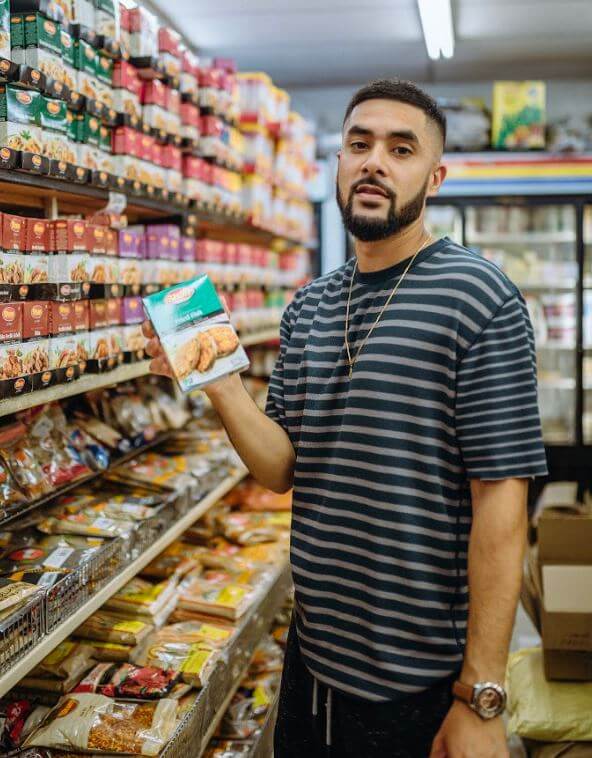
Raised in Southern California by his immigrant parents, HASEEB is an emcee and producer who currently resides and creates out of Los Angeles. As first generation American, HASEEB is a practicing Muslim. His experiences as a Muslim American millennial create the cultural backdrop for a unique narrative not often found in Hip Hop music.
With a distinct golden age meets contemporary sound, HASEEB’s music provides his listeners sounds of rhythmic nostalgia coupled with deep thought. His influences include Hip Hop legends such as The Roots, Mos Def, Binary Star, 9th Wonder, J Dilla, and those from a similar ilk.
HASEEB recently dropped his latest track ‘Friday Fish’ and off the back of that we decided to find out more…
When was the moment you realised you wanted to do rap?
3rd grade for sure. I was maybe 8 years old when I had to read a poem in the front of the class. The class clapped after I finished and told me I did a great job. I could tell that they genuinely felt it. That’s when I knew.
Coming from a Asian, muslim background — did you face any obstacles getting into hip hop?
Nah not really. My parents have always thought it’s pretty dope. Shout out to them for understanding. Also, Hip Hop draws a lot of influence from the Muslim community. Hip Hop and Islam in America have strong roots in NYC and there’s a lot of crossover culturally. Many of my favorite rappers growing up were Muslim and/or made Islamic references in their music.
How important is it for you to address societal issues in your music? And are there any themes in particular that are close to your heart?
I see it as my responsibility. I try not to be preachy or contrived. I like my music to feel authentic. So it’s really me expressing my thoughts and feelings about issues that are important to me. I’d say my music is less about speaking on particular issues, and more so just expressing what I’m thinking on a personal level.
Last year you released you LP ‘Growth’, how was it received?
I’m so grateful to how Growth was received. Though I didn’t have any major press or marketing behind the album, it still racked up over 2‑million streams and was placed on major editorial playlists on Spotify. It also allowed me to tour around the world with a couple of my favorite rap homies.
Tell us a bit about your latest track ‘Friday Fish’? Where did you get your inspiration from?
Well the hook is derived from the Jefferson’s Theme Song. That’s a classic that I wanted to flip and put my own cultural spin on it. For me, a brown South Asian kid growing up in America, black culture is what I learned and identified with early on. We didn’t really have representation in popular media. So Friday Fish is a perfect example of me being inspired by black culture while still maintaining my own cultural identity.
Whilst you grew up in Southern California, where in the world feels like home to you?
The Palms District in Los Angeles, CA. Also, my parent’s house out in the burbs.
You have been extremely popular on streaming platforms, how has the digital world helped you get your music across, and what doors has this opened for you?
It’s been everything for me. I’m one of those artists that was around to sell CDs. I used to sell CDs out the trunk, at the mall, at Venice Beach, etc. I’m young enough to effectively understand and use the digital tools we have now, but I remember what it’s like burning my music onto CDs.
What are your thoughts on the global Hip-Hop scene? Is there anywhere in the world where you really want to go and make music?
I’ve played shows in Cairo, London, Paris, Berlin, Dublin, Amsterdam, Toronto, and all over the States. The globalism of Hip Hop is honestly one of my favorite aspects.
What is the greatest gift Hip-Hop has given you?
Alluding to my answer above, the ability to travel around the world and meet people that appreciate my music means the world to me. Music has also been the tool I’ve used to be more social and outspoken.
What are you doing when you are not making music?
Playing basketball, snowboarding, and doing marketing for a major corporation that shall not be named.
What have you got in store for us?
Definitely more music and more visual content in 2020. My next drop is a song called “Lemonade Stand” so look out for that. I’m planning on dropping my project, Growing Pains, at the top of 2020 as well.
Rishma
Latest posts by Rishma (see all)
- INTERVIEW | TRELL SAVONE: FROM BUNKIE TO THE WORLD WITH “SHINE” — June 30, 2025
- NEW MUSIC | MCSOLOMON AND DERAJAH ‘KINGSTON TO LONDON’ — June 30, 2025
- REDMAN RETURNS TO THE UK THIS SUMMER FOR HIS LONG AWAITED TOUR — June 26, 2025
